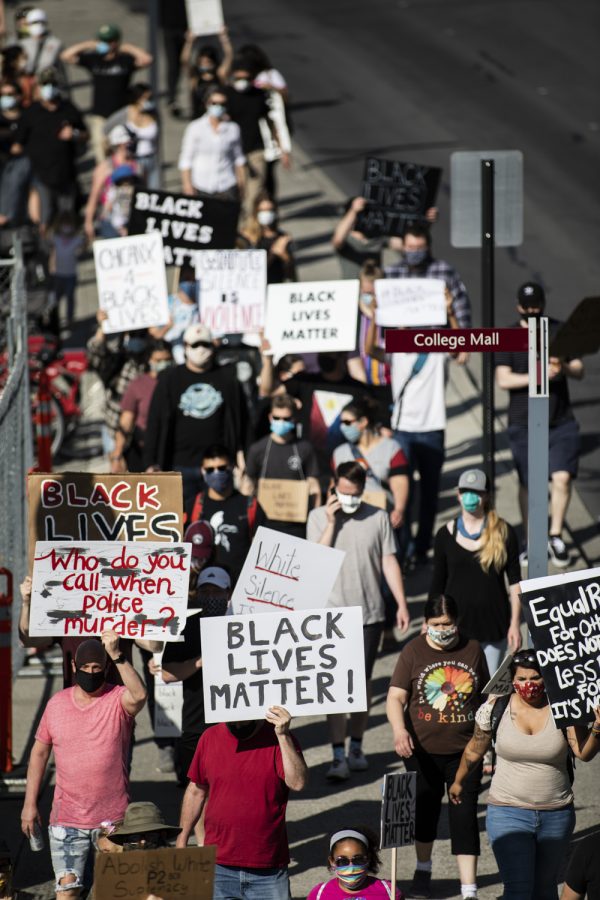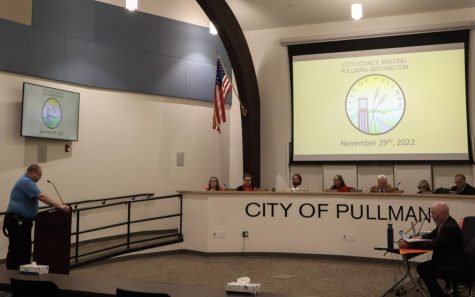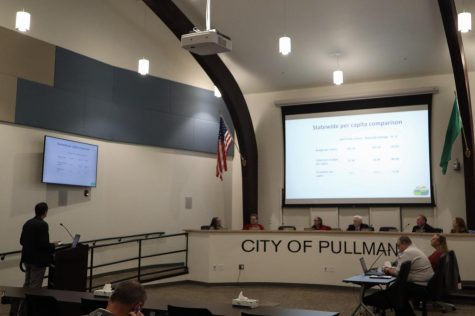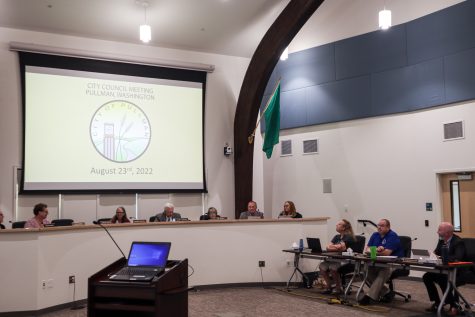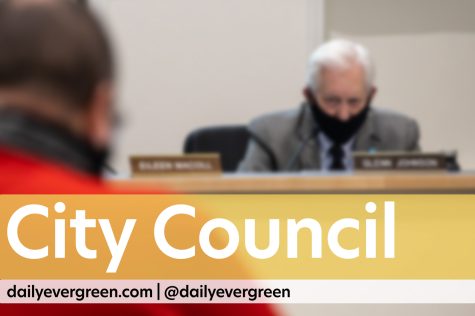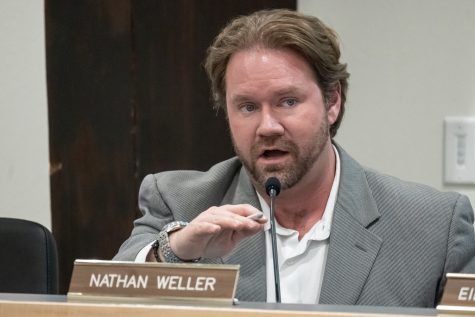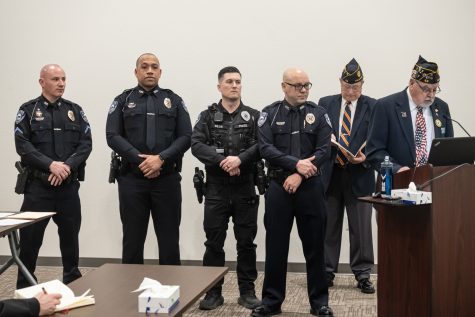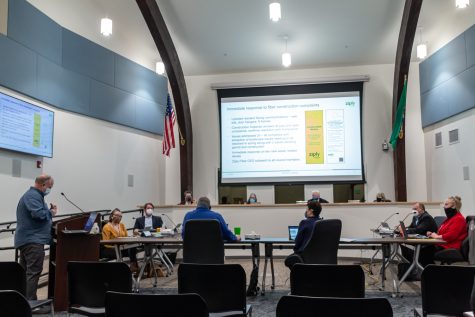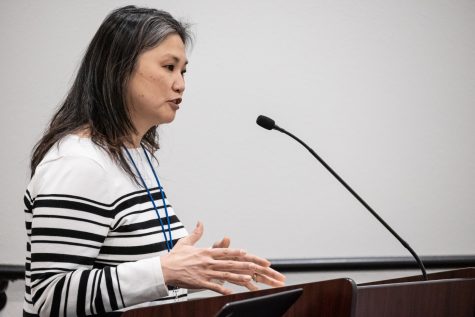Local BLM activists, police chief respond to memo about march for racial equality
Group says memo discouraged people from attending march, weakened organization’s credibility
OLIVER MCKENNA | DAILY EVERGREEN FILE
The Palouse in Solidarity with Black Lives Matter organized a protest on June 12. The Pullman Police Chief issued a memo about the demonstration.
July 3, 2020
A local Black Lives Matter group criticized a memo by Pullman Police Chief Gary Jenkins, stating it mischaracterized the organization and discouraged people from attending its march on June 12.
The Palouse in Solidarity with Black Lives Matter sent a letter to the Moscow-Pullman Daily News on June 18 clarifying any misunderstandings the memo created.
“We have written correspondence from constituents verifying that this memo created unfounded fear in the general public, discouraged many peaceful protesters from attending the event, and weakened our credibility,” PSBLM wrote in the letter.
Jenkins said he released the memo the day before the march to inform the public about the event. In the memo, Jenkins recommended that Pullman City Hall employees leave the area by 5 p.m. on the day of the march. Police were preparing to protect city hall, the Pullman Police Department and the downtown area, according to the memo.
“Initially, protest leadership was working with us to facilitate a peaceful event,” Jenkins wrote in the memo.
In their letter, PSBLM said the memo implied the group was coordinating with Pullman PD. The group only informed the police about the march and declined their offer of an escort, according to the letter.
Ivy Ndambuki, PSBLM co-organizer, said the group declined Pullman PD’s offer because some demonstrators feared the police’s presence in the march could escalate into something dangerous.
“Especially in a small town, we don’t want people to be scared,” she said. “We want people to feel comfortable to join an event and actually bring some change into our small community.”
Although PSBLM asked that police not be present, officers were seen at the event, according to the letter.
Jenkins said his department’s main concern did not relate to the group’s co-organizers. He said he was concerned about outside forces that could potentially hijack the peaceful protest.
Pullman PD received information that an armed group was going to come to Pullman to “protect the city.” Jenkins said he forwarded this information to one of the co-organizers.
“If I get the information that … there’s going to be an issue, I have an obligation to take to address that potential threat,” he said.
Jenkins said he understands how his memo might have spread fear. However, he said he needed to do the responsible thing and inform the public.
“If I had not done that, I would have likely been criticized for withholding information and not being transparent,” he said. “It’s a lose-lose situation for me.”
Jenkins said officers were monitoring the situation during the march. They were also monitoring the person who they believed was part of the armed group. Jenkins said the group did not interfere with the protest.
“I completely understand [Jenkins’] place as the police chief to be concerned and to be prepared in the case that there is violence,” Ndambuki said. “I think framing is really important when you’re discussing a social movement like this that comes with so much attention.”
There was volatility within PSBLM due to some leadership changes, according to Jenkins’ memo.
“However, due to some volatility in the makeup of the group, the initial leader has stepped down,” the memo stated.
There was no volatility within the group’s leadership, according to PSBLM’s letter. Co-organizers serve equal roles in the group.
Samantha Fulgham, PSBLM co-organizer, served as the point of contact for the police and the public. The letter said the group cooperatively decided to have Jason Kennedy, a Black man, serve in Fulgham’s place.
Fulgham said many people were uncomfortable seeing her, a White woman, as the most visible leader. She said she decided to step down from her role so that other members would become more involved in the social media and outreach portion of the group’s work.
“[Fulgham] wanted to make room for people of color to be able to have a voice,” Ndambuki said.
Fulgham said she called the police department the afternoon before the march and notified them of Kennedy’s new role, clarifying that the group did not lack leadership. PSBLM saw the memo a few hours after Fulgham’s call.
“They just assumed that if I was not going to be the social media person, then there was no leadership,” Fulgham said.
In addition, the memo’s language caused the group to be perceived as unorganized and underprepared. Ndambuki said this made some people reluctant to attend the event.
“The word volatile – that’s what bothered me the most,” she said. “It made it seem like we could’ve exploded at any moment, which wasn’t the truth.”
Jeremiah Akin, PSBLM co-organizer, said the protest was peaceful. There were no incidents of property damage, he said, and protesters left the area clean.
He said the memo created a tense environment and a climate of fear, discouraging individuals from participating in the march.
“That climate of fear, I think, also provokes people,” Akin said. “I think it provokes violence, often violent counter-protesters.”
Jenkins said he believes the best way to have a peaceful and effective protest is for groups to work with the police department.
“This was kind of an example of what happens when a group doesn’t want to work with the police,” he said. “Now there’s this miscommunication and suspicion of motives.”
After the protest, Jenkins said he congratulated the co-organizers for the peaceful event.
“We are all glad the event was completely peaceful,” Jenkins wrote in a letter he sent to Moscow-Pullman Daily News. “However, the good result is not proof that precautions should not be taken, any more than wearing your seatbelt and not getting into a collision means you don’t need to wear your seatbelt anymore.”
Pullman PD could have communicated with PSBLM co-organizers prior to the memo’s release to avoid any misunderstandings, according to PSBLM’s letter. It also encouraged the police and the public to become more aware of the importance of language.
“Just before you speak, check your prejudice,” Ndambuki said, “and ask yourself if you’re perceiving the situation as it is or as your prejudice is perceiving it.”

